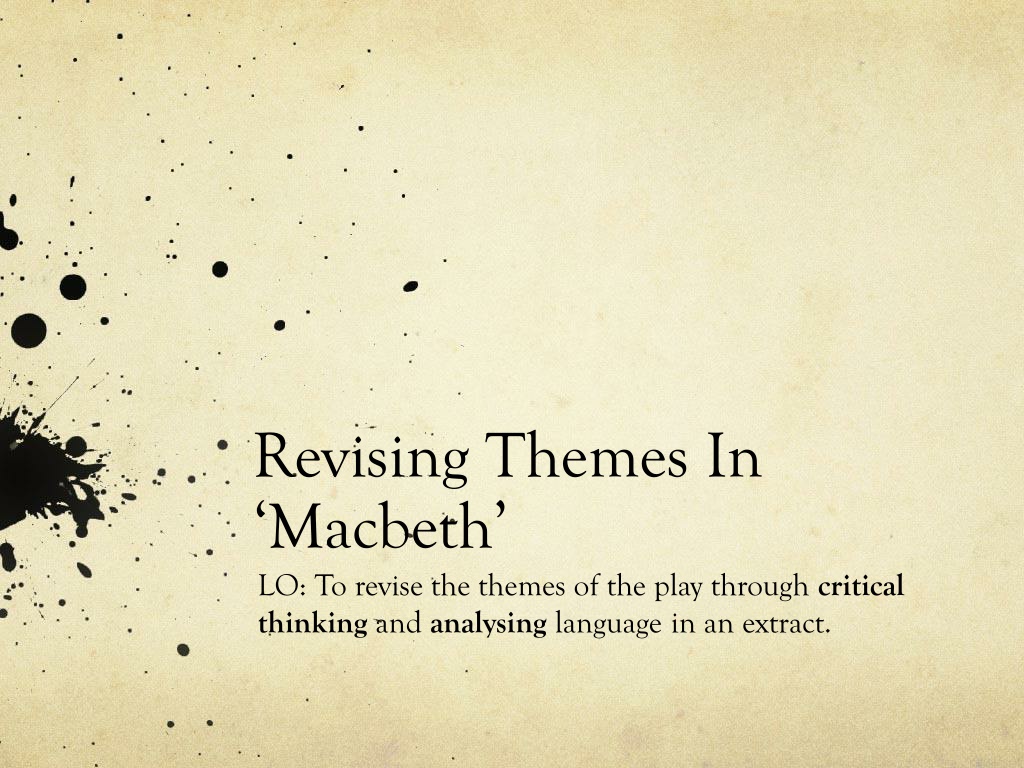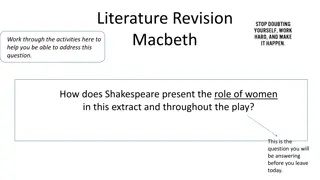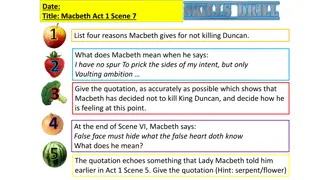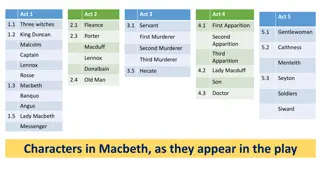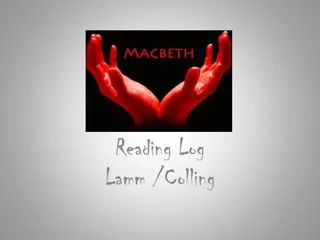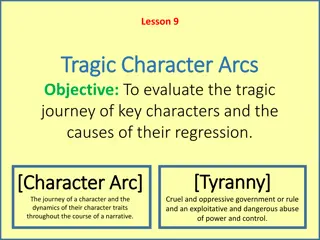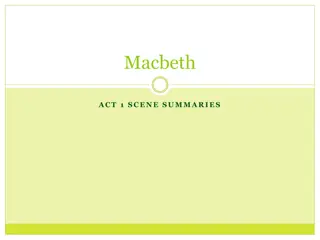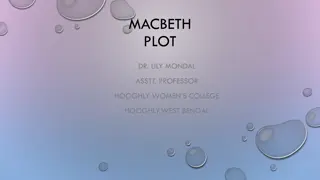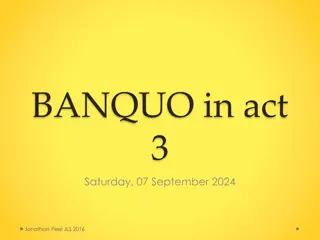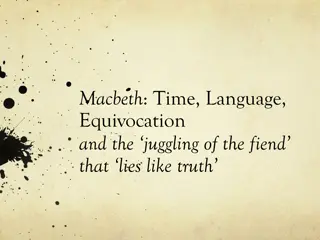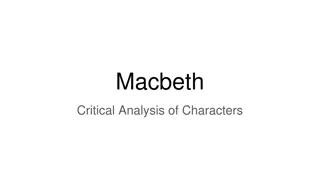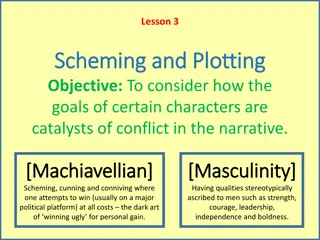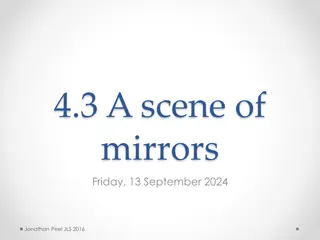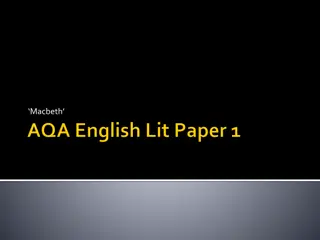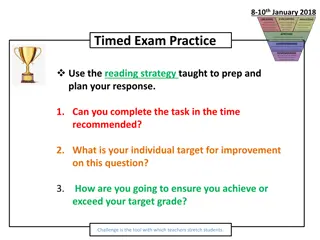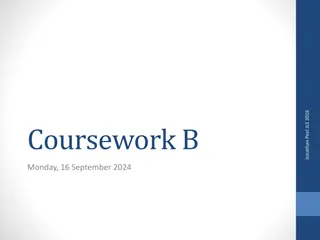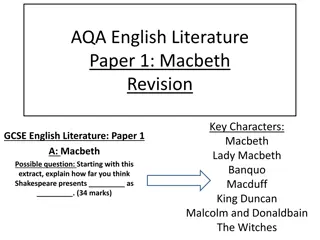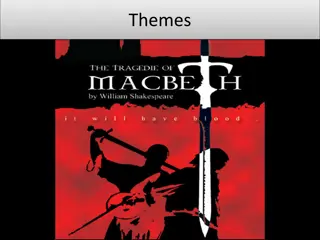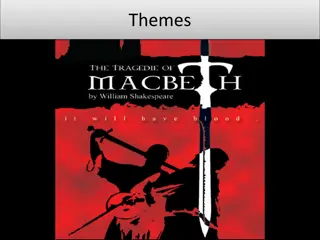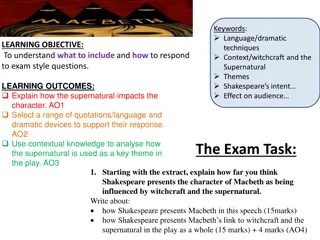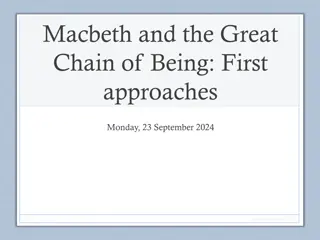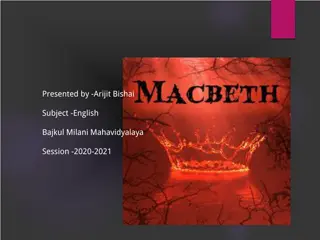Exploring Themes in Shakespeare's Macbeth: Critical Analysis and Reflection
Delve into the themes of blood, night, and sleep in Shakespeare's Macbeth through critical thinking and language analysis. Understand the significance of these recurring words in the play, ponder on the universal themes presented, and consider the contextual relevance of Shakespeare's thematic explorations. Uncover the timeless relevance of Macbeth's themes and engage in thought-provoking discussions on the key motifs portrayed in the play.
Download Presentation

Please find below an Image/Link to download the presentation.
The content on the website is provided AS IS for your information and personal use only. It may not be sold, licensed, or shared on other websites without obtaining consent from the author. Download presentation by click this link. If you encounter any issues during the download, it is possible that the publisher has removed the file from their server.
E N D
Presentation Transcript
Revising Themes In Macbeth LO: To revise the themes of the play through critical thinking and analysing language in an extract.
Think What can the words blood, night and sleep tell us about the themes of Macbeth?
Task What is a theme? Can you come up with a definition? How are themes presented? What are the main themes of Macbeth ? Challenge: Look at the short extract you have been given. What words help you to understand the themes of the play?
Exam Tip It s always useful to consider where in the play the extract is from. What has happened just before and what happens next. Act 2 Scene 1 Is this a dagger which I see before me, The handle toward my hand? Come, let me clutch thee. I have thee not, and yet I see thee still. Art thou not, fatal vision, sensible To feeling as to sight? Or art thou but A dagger of the mind, a false creation, Proceeding from the heat-oppress d brain? I see thee yet, in form as palpable As this which now I draw. Thou marshall st me the way that I was going, And such an instrument I was to use. Mine eyes are made the fools o' th' other senses, Or else worth all the rest. I see thee still, And on thy blade and dudgeon gouts of blood, Which was not so before. There s no such thing. It is the bloody business which informs Thus to mine eyes. Now o'er the one half-world Nature seems dead, and wicked dreams abuse The curtained sleep. 5 10 15
Review Themes are the subject matter that Shakespeare explores dramatically through the experience of his characters. Shakespeare unfolds themes through language. Themes are universal and often timeless, thus Macbeth is as relevant today as it was 400 years ago. The words blood, night and sleep appear numerous times in Macbeth . Blood over 40 times! Why? What themes do you think Macbeth is exploring/presenting through the repeated use of these words? Revision task: For more on the use of words in the play go to: http://www.bbc.co.uk/education/guides/zpdq2hv/revision/3 word crunching
The Context of Themes Certain themes seem to have interested Shakespeare his whole life and are in every one of his plays: Task: Find an example of each of these themes in Macbeth . Conflict Appearance and reality Extra challenge: Find a quote to illustrate the theme. Order and disorder Change Why do your think Shakespeare was so interested in these particular themes?
Thinking Critically about Themes In your groups, you will now read the nine statements you have been given which relate to the different themes of the play. Discuss each of the statements and decide how far you agree with it. Arrange the cards in a diamond nine to show the order of importance of each of the themes. You must justify the position of each theme and provide evidence to support your choice.
Diamond 9 Put the main theme at the top Most important theme Least important theme
Compare How are our diamonds similar? Did we agree on the order of the themes?
Extra Information I will now give each group some extra information which relates to a specific theme. Discuss the information. Does it add to your argument or does it challenge it? Make any final changes to your Diamond 9.
Extra information Macbeth possesses enough self-awareness to realise the dangers of overzealous ambition: I have no spur / To prick the sides of my intent, but only / Vaulting ambition which o erleaps itself / And falls on th other (25-28). But he does it anyway! Why? Would Macbeth have committed such heinous crimes if not for the prophecy? What if he had ignored the witches statements? The witches know Macbeth s tragic flaw: given the irresistible temptation to become King. Why does he choose to commit murder even though he could simply discard their words.
Some of the most famous and poetic lines from Macbeth are expressions of remorse. Will all great Neptune s ocean wash this blood / Clean from my hand? exclaims Macbeth after he stabs Duncan. Macbeth is the only one who sees the ghost in a crowded room; is this yet another projection of his feverish mind? Or is it really, so to speak, a supernatural occurrence? Many scenes conclude with lines of dichotomy or equivocation: Hear it not, Duncan; for it is a knell / That summons thee to heaven or hell (II i64); God s benison go with you, and with those/ That would make good of bad, and friends of foes (II iv 41-42). Such lines evoke an air of deep uncertainty: while polarities are reversed and established values are overturned. Why does Shakespeare do this? As Duncan s guards pray God bless us on their deathbed, Macbeth cannot say one Amen (II ii 26-27). His fate is thus sealed entirely by his own hands.
Apply Look at the extract again. Which theme(s) do you think are most clearly being explored/presented. Use your diamond 9 and also look closely at the words that Shakespeare uses. Write a paragraph about the way Shakespeare presents this theme in the extract. You could use some of the sentence starters on the next slide to help you.
Possible sentence starters In the extract, Shakespeare explores the theme of (make a clear point) The word is used to (add evidence) This suggests that (analyse the language) Shakespeare uses (can you add a technique?) Shakespeare does this to show (writer s intention) The overall effect of this is (effect on the audience) An alternative interpretation might be (consider different audience responses) This reflects the world in which Shakespeare lived since (consider the context)
Check your learning Swap your work with a partner. Consider whether they have convinced you about the main theme of the extract. Have they included all the elements below? (make a clear point) Grade 3 (add evidence) (analyse the language) Grade 4 (can you add a technique?) (writer s intention) (effect on the audience) Grade 5 (consider the context) Grade 5 consider different audience responses) Grade 6
Final thought Class vote on main theme of extract.
